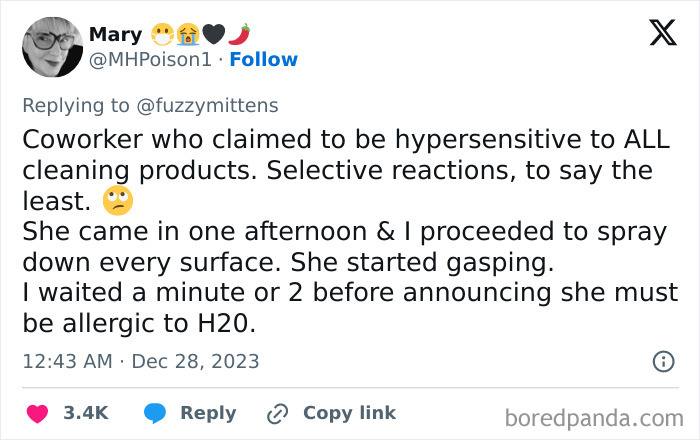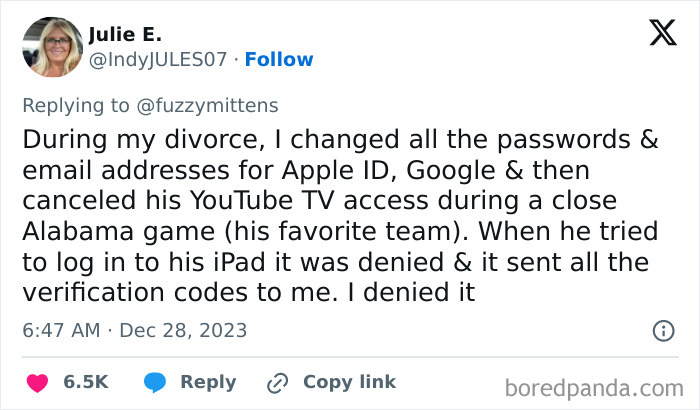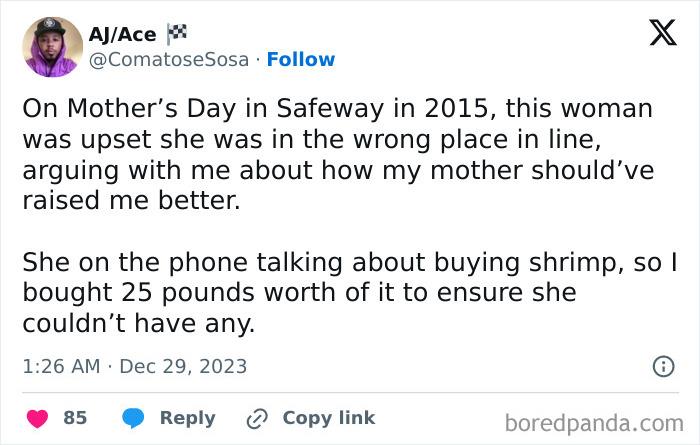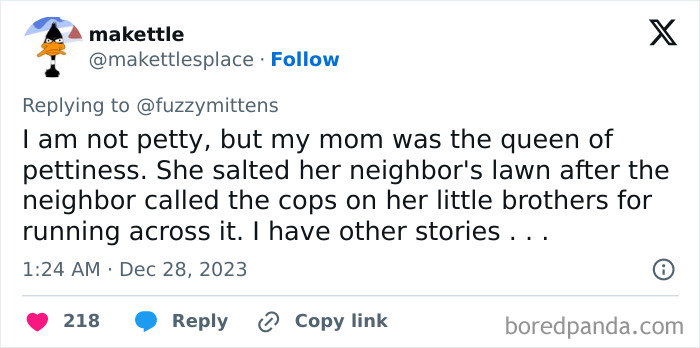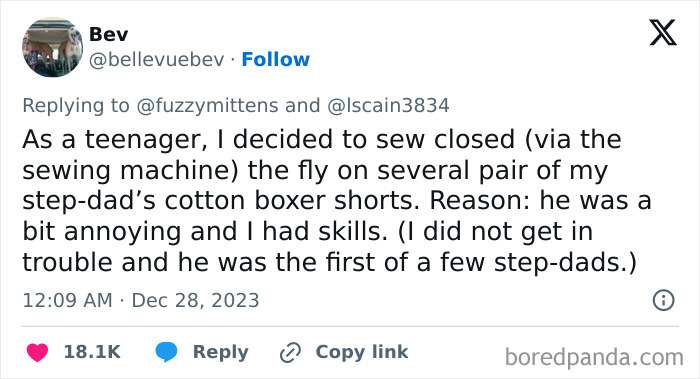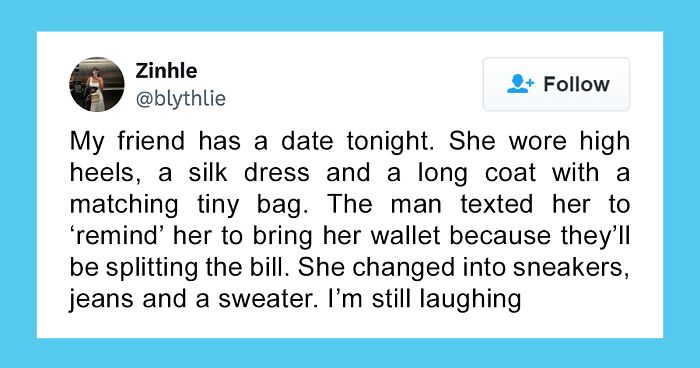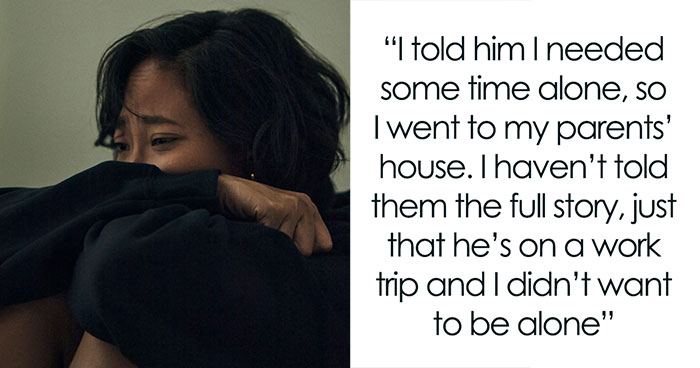
“Cancelled His 1st Class Ticket”: 30 People Share The Pettiest Things They’ve Ever Done
Interview With ExpertThe healthy way to react when someone’s annoying or mean is to be the bigger person. Embrace what’s happened, forgive them, and move on with your life. Or respond with unexpected kindness. But nobody’s ‘perfect.’ Sometimes, we can’t help but seek revenge to teach others a lesson. This is far more common than you might think.
The users of X, formerly Twitter, recently opened up about the pettiest things they’ve ever done in a viral thread that was viewed tens of millions of times. It is both a hilarious and low-key frightening read about the extent to which some people will go to punish others. Scroll down to see what they shared.
Bored Panda reached out to licensed professional counselor Rodney Luster, Ph.D., for his thoughts on the healthy way to react to people who we find rude, as well as how to be less responsive to insults, whether real or perceived. He shared how deploying a 'forced opposites' approach in the face of rudeness can have unexpectedly positive results. Dr. Luster is the founder of 'Inspirethought' and the host of the ‘More Than a Feeling’ blog on Psychology Today.

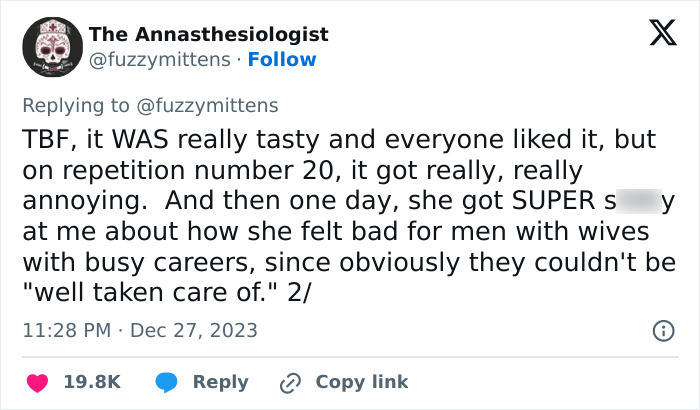

Image credits: fuzzymittens
This post may include affiliate links.
"Most of the time, people respond to perceived rudeness or insults defensively, instinctually, by going inward or reacting to rude behavior. But there is more going on in the experience that is often missed because our brains code information that stands out dramatically rather than contextually. In other words, rude remarks as we are confronted with them, lack greater context. Thus, we simply rely on what we are seeing and experiencing for what it is," Dr. Luster, the founder of 'Inspirethought' and the host of the ‘More Than a Feeling’ blog on Psychology Today, shared with us via email.
"Rudeness or rude behavior can be considered a 'semantic meta-language' all its own, with its own degrees and variabilities of impoliteness scattered in between. But, there is also an important 'pragmatic competence' we can bring to the picture when we are met by what we or others may consider 'rudeness.'"
However many generations that is, I hope the story is always told with it.
The professional counselor referred to research done by Sophia Waters in 2012 where she presented rudeness as "a unique, non-cooperative or competitive kind of behavior that often ends up destabilizing basic interactions."
Dr. Luster said: "If we take a moment to qualify the other person's state, more often than not, such rudeness comes from the perceived injustices the person may feel they have experienced whether before or during an interaction."
He suggested that instead of reacting to the rudeness, we ought to challenge our limbic system. "The limbic area of the brain is responsible for many things, and also contains much of the 'feeling state' energy we feel when rude behavior crosses our paths. Rude behaviors may trigger emotions in us, as we weigh what has just happened against our own inventory of what is right, what is wrong, and slights that feel like injustices. But these are responses that don't need reactions that seek to equalize the status quo," the founder of 'Inspirethought' explained to Bored Panda.
"When we are confronted with rude behavior, the person dispensing the behavior seeks to convey something, and perhaps even expects a response. However, not responding to their behavior throws a wrench in all of it. You don't have to respond, and in fact, challenging your responses can be a healthy way to learn to exercise internal control. Revisioning such contexts as opportunities to exercise your own internal controls is a much better alternative. Let that executive front brain functioning kick in!"
I know people who claim they are allergic to cell phone radiation. They always ask me to turn off my smartphone when I visit them. I turn the smartphone off theatrically in front of them and then secretly turn it on again. The allergy is still gone. The human mind is powerful. For a long time I thought I was allergic to nuts because my mother told me that they made me fat and disgusting. A stay in the psychiatric hospital and I was no longer allergic to nuts. Here in Germany there are also a lot of people who are a kind of "allergic" to cold weather. It's called frigophobia - the believe of getting sick from cold weather. A mental disorder but it is so common here..nobody seems to know it is a mental disorder.
Meanwhile, Dr. Luster shed some light on how we can all be less responsive to insults. However, he warned that we don't want to take away "our inherent need to defend ourselves." The host of the ‘More Than a Feeling’ blog said that when we do experience a real insult, one of the greatest tools that we can all exercise is called 'cognitive optioning.'
"A technique I use with my clients is teaching them to engage in a 'forced opposites' approach. This cognitive behavioral therapy (CBT) hack is one that requires practice, but once enabled, it really changes the dimensions of situations where 'rude' behavior has been dispensed. A forced opposites approach requires the person to do the exact opposite of what the person dispensing the rude behavior may expect. This is done of course with the goal of productive outcomes," he shared with Bored Panda.
"Forced opposite approaches require you take an alternative path that by its very nature is unexpected and strategic." An example of this would be to respond with kindness or understanding. And it's not something that the person who's rude would expect.
Dr. Luster opened up to us that he's personally seen this tool work in many situations. "One story was about a manager who was confronting employees during annual review time. Many left his office angry and visibly upset. One person who used a forced opposites approach decided to instead, go in for the review with pen and paper, and listen to the manager's insights without reacting but instead, attempting to see things from their perspective, seeking the opportunities in what they were saying to try and deliver to their expectations."
The counselor continued: "Although the manager started out defensive, perhaps loud, and rude, his demeanor changed as the review proceeded because of the way the employee was reacting back: interested to know more, to see behind their eyes what they needed to work on, and assuming a non-defensive demeanor. It was a surprise to the manager who remarked about it later as he was having a tough day dealing with employees who also walked in confrontational. That employee walked out with a raise."
According to the expert, a 'forced opposites' approach can yield some surprising results, whatever the context.
Question .. why didn't your hubby do this?? It's HIS friend! I need an update on the status of this marriage
The online thread, created by X user The Annasthesiologist, aka @fuzzymittens, was a massive success on the social network. It was viewed 27.4 million times and counting at the time of writing.
But what’s even more impressive is just how open and honest many X users were with everyone else in the comments. They seemed happy to spill the tea about some of the lowest moments of their lives. It shows a lot of self-awareness and a willingness to take responsibility.
Pettiness, anger, and revenge are all linked to the desire for justice. When we perceive real or imagined injustices in life, we want to ‘balance the scales,’ so to speak. That’s why we might verbally lash out at someone being rude to us. Or why we spend hours or even days fuming after we’re denied a raise or that promotion we’d been seeking. There’s a clear wrong that we want to right.
As the examples in this post clearly show, we sometimes get worked up over completely ordinary slights. Say, when someone’s slightly annoying or arrogant. It’s natural to feel upset. However, it’s clearly petty behavior if we punish someone over such minor mistakes. We should know better than to give in to our intrusive thoughts.
However, some of the other stories in The Annasthesiologist’s thread deal with heavier topics like infidelity. While it’s natural to want some sort of revenge or closure when your heart’s broken, in the long run, sewing shrimp into someone’s curtains isn’t the healthiest decision. It’s understandable, yes. But it probably won’t help you move on.
If you want emotional closure with someone who has genuinely wronged you, there are two main approaches you can take. The first one is quite unpleasant. It requires you to have an honest-to-God conversation with the other person, where you’re open about how their behavior made you feel.
I'm the sort of person who will respect another persons life choices but become petty when they don't respect mine
The idea isn’t simply to vent or to ‘prove’ that the other person is wrong. It’s about sorting through your feelings and understanding why someone did what they did.
The second approach is reaching out to a mental health expert to help you reframe your experiences. Therapy can be an incredibly powerful tool if you’re willing to give it a chance and have some patience.
No therapist on Earth can snap their fingers and make your problems disappear. What they can do, however, is assist and guide you through your journey in solving your issues. They can offer you objective insights that you might not come to on your own.
While often quite satisfying in the moment, revenge has a lot of negative consequences for everyone further down the line. Anger management expert and licensed clinical psychologist Bernard Golden, Ph.D., points out that vengeful thoughts and behavior are often only a “temporary distraction from underlying suffering.”
According to psychologist Golden, seeking revenge can lead to a cycle of wanting more revenge. This is because people expect it to be enjoyable as they hunt for an emotional release. However, aside from an initial burst of emotions, revenge is often far less satisfying than anticipated. And it gives others a justification to enact revenge on you in turn, even if you were originally the victim.
As a bisexual, I haven't touched anyone in years in case I accidentally start having wild sex with them moments later. It's a tough life to live.
At the end of the day, it’s only beneficial if we slow down, take a step back, and view the situation we’re in from a long-term perspective. Think about what consequences your behavior can have. Some pettiness here and there probably won’t wreck your reputation and relationships. But if it’s a consistent behavior pattern, you might have to work on yourself to rise above some slights.
A person dashed in front of me at the checkout and put all their groceries on the belt. When they turned away, I took the sauce that tied all their ingredients together and put it on the shelf behind me.
Reframing your perspective on revenge is about becoming a better person and letting at least some of the little things go. Otherwise, you might find yourself emotionally exhausted as every little thing triggers incredibly intense emotions in you. Emotional resilience is a heck of a skill to develop.
if you are now thinking about doing this, don't. especially if you are doing it to someone you don't know and can't be sure of their medical situation. maybe the roommate was quitting caffeine for medical reasons. not only is it illegal in some places, it can also be dangerous. caffeine can affect people with heart issues or on certain medications. for me, caffeine affects my blood sugar (type 1 diabetes) so if i am drinking coffee i have to take insulin for the anticipated rise in blood glucose levels. if i take the insulin and unknowingly get decaf instead, i could have a hypoglycemic reaction, with a chance of seizure and/or coma. it's unlikely, but not impossible. food tampering is dumb and beyond petty into just plain mean.
About half these seem like wishful thinking BS. Half the rest are psychopathic and not in a funny way.
Maybe so...but nobody said they had to be funny.... just petty.
Load More Replies...One time my coworker took my tape dispenser without asking, so I set fire to his house.
Some of these, without context, sound unhinged. Like, you can't just say "I was going though a divorce" and then do some crazy s**t without saying the ex cheated or something. I'm assuming they're not the crazy ex but...
About half these seem like wishful thinking BS. Half the rest are psychopathic and not in a funny way.
Maybe so...but nobody said they had to be funny.... just petty.
Load More Replies...One time my coworker took my tape dispenser without asking, so I set fire to his house.
Some of these, without context, sound unhinged. Like, you can't just say "I was going though a divorce" and then do some crazy s**t without saying the ex cheated or something. I'm assuming they're not the crazy ex but...

 Dark Mode
Dark Mode 

 No fees, cancel anytime
No fees, cancel anytime 
















